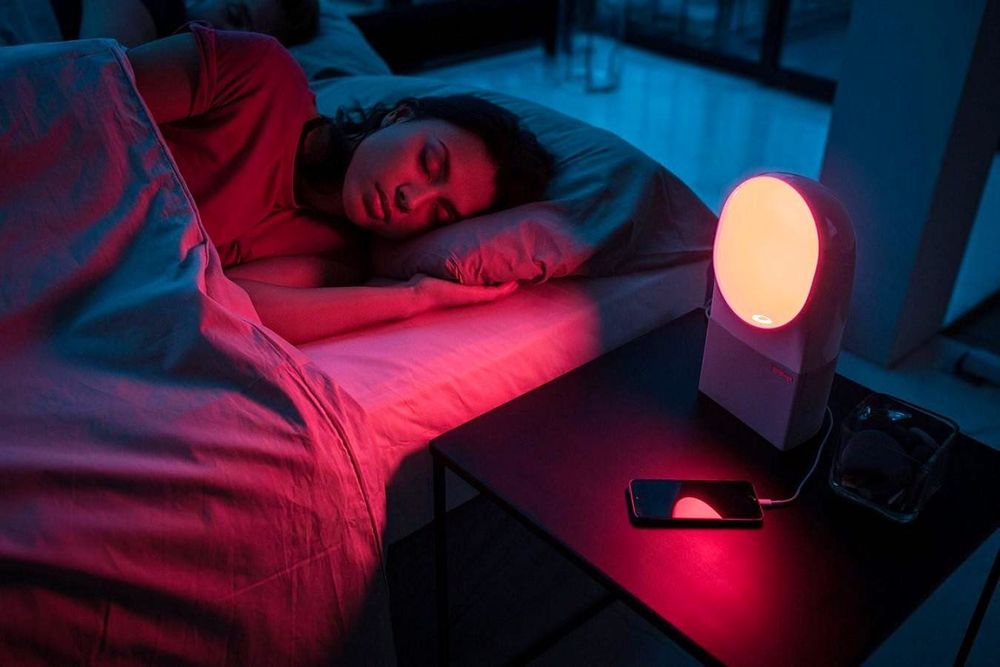This is an automatically translated article.
Most people know that turning on bright lights and blue light from electronic devices at night can interfere with sleep. But you may not know, red light also affects sleep. Experts say that using red light at night can support a good night's sleep.
1. Things to know about red light
1.1. Define
The type of red light mentioned in this article is light that emits red wavelengths - not simply a light bulb dyed red. While red-tinted bulbs are soothing and can put you in a good mood, they don't actually produce red wavelengths of light. Therefore, ordinary red light bulbs will not have a good effect on sleep.
Meanwhile, the red light wavelength stimulates the production of melatonin - a naturally produced hormone that helps you fall asleep. The human brain automatically releases more melatonin when it's dark and tends to produce less when exposed to light.
1.2. Support good sleep
A small 2012 study evaluated the effects of red light therapy in 20 female athletes. Some participants were assigned 30 minutes of red light therapy every night for 14 days. Results: They had improved sleep quality, melatonin levels, and endurance performance more than the placebo group that did not receive light therapy.
In 2019, a 3-week study of 19 people working in an office environment found that: Using a combination of red and white light in the afternoon improved circadian rhythms, as well as boost alertness after lunch - a period when many office workers experience reduced energy levels.
A small study conducted in 2017 showed that the color of light is strongly related to the ability to fall asleep. In addition, personal preference can also influence which colors help you sleep better. However, more large-scale studies are still needed to fully understand how red light at night affects sleep.

Theo một số nghiên cứu, ánh sáng đỏ có thể cải thiện giấc ngủ.
1.3. Reduce fatigue when waking up
Many people experience a lingering feeling of lethargy after waking up. This condition can affect your short-term memory, alertness, and performance.
A small 2019 study found that shining a bright red light through closed eyelids - at levels that don't block melatonin, can help reduce feelings of grogginess and grogginess when you wake up from a good night's sleep. .
1.4. Vision at night
Some nights, the glare of white light can make you squint and make it difficult to see well. Meanwhile, the red light is not dazzling, so it can help you see better at night.
This is why you will easily see red lights in the cockpits of airplanes and submarines, and why astronomers and stargazers often use flashlights that emit red light.
2. What color light should be avoided at night?
Some light colors are easy to mess up your circadian rhythm. However, it should be noted that any type of light can interfere with a good night's sleep if it is turned on at too high a intensity or directed at your face.
Blue and white light is good during the day because it can help you feel awake after waking up. At night, blue light can make it harder to fall asleep. This is because the wavelengths of blue light can prevent the brain from producing melatonin, the hormone that helps you feel sleepy.
In addition to being naturally emitted by the sun, blue light waves also occur from:
Fluorescent lights. Led light. TELEVISION. Mobile device. Computer screen. Monitors of other electronic devices, such as game consoles. If you're having trouble sleeping, try avoiding blue light and bright light exposure near bedtime. Specifically, turn off the TV and put away your phone, tablet and laptop at least 30 minutes before bed. Also, try to gradually reduce the brightness in your home at night.
Meanwhile, yellow and orange light has little effect on the biological clock, so you can use these two colors or the red light is very dim at night.

Tiếp xúc với ánh sáng xanh vào ban đêm khiến bạn khó ngủ hơn.
3. How does light affect your sleep?
Light plays an important role in your circadian rhythm and sleep. The circadian rhythm is the internal "24-hour clock" that helps you feel sleepy at night when it's dark and makes you feel awake during the day.
Exposure to light gives the brain information to guide circadian rhythms. In the natural light model, the circadian rhythm will follow sunrise and sunset. However, the modern world is filled with artificial sources of light, causing us to fall out of this natural cycle.
Some studies say that exposure to light at the wrong time can disrupt the biological clock and affect health. When your circadian rhythm is messed up, you can fall into a vicious cycle: You can't get a good night's sleep, feel tired, and need a nap during the day.
Here are a few ways you can use light to regain your circadian rhythm.
Night:
If possible, block all light from entering your bedroom. Consider installing blackout curtains or using an eye mask while sleeping. If you use a night light, choose one that emits a dim red, orange, or yellow light. Turn off or use night mode on electronic devices that shine in your bedroom. To really get back to your circadian rhythm, avoid screen time 30 minutes to 1 hour before bedtime. Daytime:
Open the window blinds in the morning when you wake up to let the sun in as soon as possible. Turn on some low wattage lights if you have to get up before sunrise. All day exposure to natural light improves alertness and mood. In addition to light, you also need to take other measures to improve sleep, such as avoiding caffeine, alcohol and vigorous exercise before bed. If you still have sleep disturbances, see your doctor to see if you have a medical condition that needs treatment.
Light therapy is a good option for people with sleep disorders, but it's best to discuss with your doctor first to choose the right type of light and use it at the right time of day.
In summary, red light at night does not adversely affect sleep like blue light, but on the contrary, can also improve your sleep. If you want a better night's sleep, choose products that emit red wavelengths instead of light bulbs that are simply dyed red. Also, try to expose yourself to the sun during the day, turn on dim lights in the evening and block out all light sources when it's time to go to bed. Sleep problems can affect your physical and mental health. So, see your doctor to check if you can't fix it with home remedies.
Don't forget to follow the website: Vinmec.com regularly to update many other useful information.
Reference articles: healthline.com, cdc.gov













